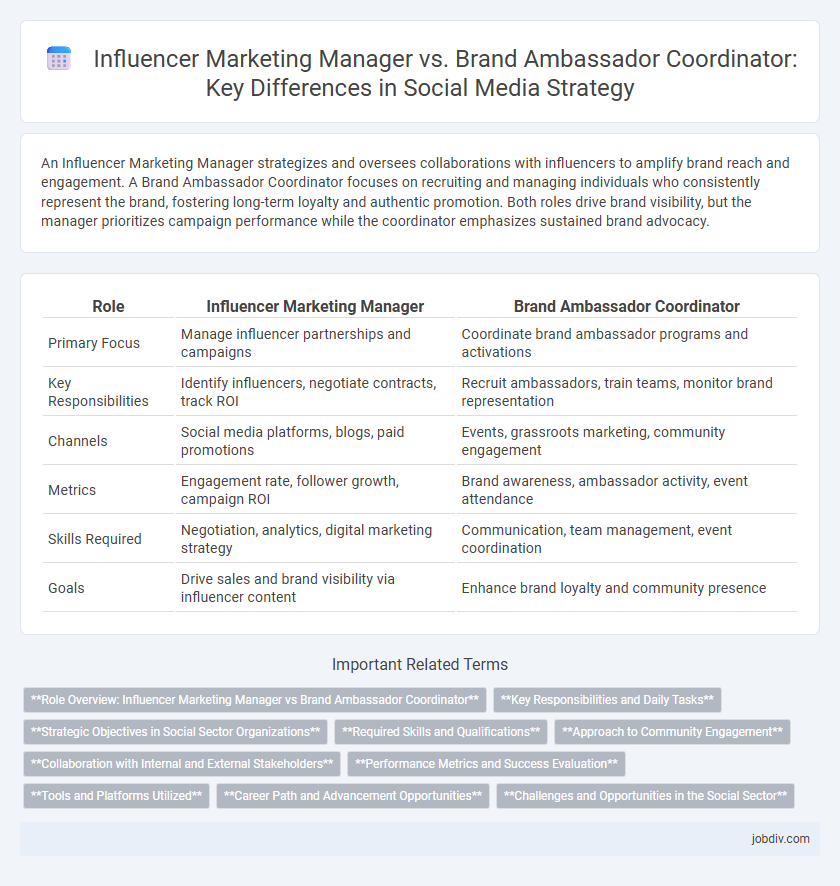An Influencer Marketing Manager strategizes and oversees collaborations with influencers to amplify brand reach and engagement. A Brand Ambassador Coordinator focuses on recruiting and managing individuals who consistently represent the brand, fostering long-term loyalty and authentic promotion. Both roles drive brand visibility, but the manager prioritizes campaign performance while the coordinator emphasizes sustained brand advocacy.
Table of Comparison
| Role | Influencer Marketing Manager | Brand Ambassador Coordinator |
|---|---|---|
| Primary Focus | Manage influencer partnerships and campaigns | Coordinate brand ambassador programs and activations |
| Key Responsibilities | Identify influencers, negotiate contracts, track ROI | Recruit ambassadors, train teams, monitor brand representation |
| Channels | Social media platforms, blogs, paid promotions | Events, grassroots marketing, community engagement |
| Metrics | Engagement rate, follower growth, campaign ROI | Brand awareness, ambassador activity, event attendance |
| Skills Required | Negotiation, analytics, digital marketing strategy | Communication, team management, event coordination |
| Goals | Drive sales and brand visibility via influencer content | Enhance brand loyalty and community presence |
Role Overview: Influencer Marketing Manager vs Brand Ambassador Coordinator
Influencer Marketing Managers strategize and execute campaigns leveraging social media personalities to enhance brand visibility and drive conversions, focusing on influencer identification, relationship management, and performance analysis. Brand Ambassador Coordinators recruit, train, and support brand ambassadors who authentically represent the company's values and products in target communities, emphasizing grassroots engagement and long-term brand loyalty. Both roles require expertise in social media trends, audience engagement metrics, and collaboration with marketing teams to optimize brand awareness and customer advocacy.
Key Responsibilities and Daily Tasks
An Influencer Marketing Manager develops and executes strategies to collaborate with influencers, overseeing campaign planning, budget management, and performance analytics to maximize brand reach. A Brand Ambassador Coordinator recruits, trains, and manages brand ambassadors, ensuring consistent brand messaging through direct engagement and event execution. Both roles require strong communication skills, but the Influencer Marketing Manager focuses more on digital influencer partnerships, while the Brand Ambassador Coordinator emphasizes in-person community engagement.
Strategic Objectives in Social Sector Organizations
Influencer Marketing Managers target broad audience engagement by leveraging social media influencers to amplify organizational messages and increase visibility within key demographics. Brand Ambassador Coordinators focus on cultivating authentic relationships with dedicated individuals who embody the organization's mission, driving grassroots advocacy and community trust. Both roles align strategic objectives to enhance social impact, but Influencer Marketing Managers emphasize scalable reach while Brand Ambassador Coordinators prioritize deep, personalized engagement.
Required Skills and Qualifications
An Influencer Marketing Manager must possess expertise in digital marketing strategies, data analytics, and influencer relationship management, with strong skills in campaign planning and contract negotiation. Brand Ambassador Coordinators require excellent communication, interpersonal abilities, and event coordination experience, emphasizing brand promotion and community engagement. Both roles demand proficiency in social media platforms, content creation, and trend analysis to maximize brand visibility and audience reach.
Approach to Community Engagement
Influencer Marketing Managers leverage data-driven strategies and targeted campaigns to engage niche audiences through key opinion leaders, maximizing brand reach and conversion. Brand Ambassador Coordinators focus on fostering authentic, long-term relationships by empowering brand ambassadors to create genuine community interactions and grassroots advocacy. Both roles prioritize audience connection but differ in scale and depth of community engagement tactics.
Collaboration with Internal and External Stakeholders
Influencer Marketing Managers coordinate closely with internal teams such as marketing, PR, and product development while managing relationships with external influencers and agencies to execute targeted campaigns. Brand Ambassador Coordinators primarily focus on building and sustaining long-term partnerships with brand ambassadors, collaborating internally to align ambassador activities with company goals and externally to support ambassadors through training and resources. Both roles require strategic communication and relationship management skills to ensure cohesive brand messaging across multiple channels.
Performance Metrics and Success Evaluation
Influencer Marketing Managers prioritize engagement rates, ROI, and conversion metrics to assess campaign effectiveness, leveraging data analytics tools for precise measurement. Brand Ambassador Coordinators focus on long-term brand loyalty, community growth, and sentiment analysis, emphasizing sustained relationship-building over immediate sales impact. Both roles use performance metrics to optimize strategies, but the Influencer Marketing Manager targets quantifiable campaign success while the Brand Ambassador Coordinator evaluates ongoing brand affinity and advocacy.
Tools and Platforms Utilized
An Influencer Marketing Manager primarily utilizes advanced platforms like Traackr, AspireIQ, and Hootsuite for influencer discovery, campaign management, and performance analytics, optimizing reach and engagement through data-driven insights. In contrast, a Brand Ambassador Coordinator relies on relationship management tools such as BrandChamp and SocialLadder to recruit, track, and motivate brand ambassadors, ensuring consistent brand representation and grassroots marketing efforts. Both roles leverage CRM systems and social media monitoring tools, but the Influencer Marketing Manager emphasizes scalable digital campaigns, while the Brand Ambassador Coordinator focuses on personalized, community-based promotion.
Career Path and Advancement Opportunities
Influencer Marketing Managers typically follow a career path that evolves from social media specialist roles to senior marketing positions, leveraging data analytics and campaign management skills to drive brand awareness and engagement. Brand Ambassador Coordinators often advance by developing deep community relationships and brand loyalty strategies, progressing towards roles like community manager or brand strategist focused on long-term advocacy. Both career paths offer advancement opportunities through specialization in digital marketing technologies, influencer partnerships, and strategic brand positioning.
Challenges and Opportunities in the Social Sector
Influencer Marketing Managers face challenges in navigating rapidly changing algorithms and maintaining authentic engagement while leveraging data analytics for targeted campaigns. Brand Ambassador Coordinators encounter opportunities in building long-term relationships and fostering community loyalty, though they must overcome difficulties in measuring ROI and managing diverse ambassador networks. Both roles require strategic adaptation to evolving social trends and consumer behaviors to maximize brand impact and social influence.
Influencer Marketing Manager vs Brand Ambassador Coordinator Infographic

 jobdiv.com
jobdiv.com